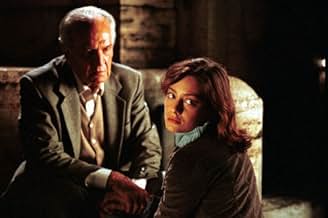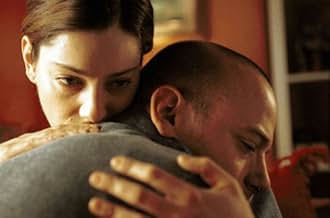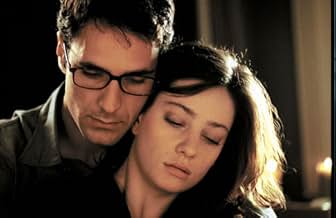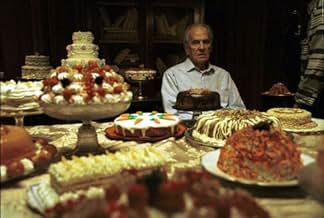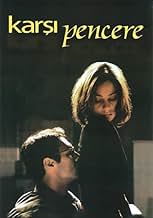NOTE IMDb
7,2/10
12 k
MA NOTE

Lire clip2:59
Regarder Facing Windows Scene: I Don't Taste Things As Good As I Once Did
Ajouter une intrigue dans votre langueOverburdened and stuck in a greying marriage, Giovanna takes to caring for the Jewish Holocaust survivor her husband brings home. As she begins to reflect on her life, she turns to the man w... Tout lireOverburdened and stuck in a greying marriage, Giovanna takes to caring for the Jewish Holocaust survivor her husband brings home. As she begins to reflect on her life, she turns to the man who lives across from her ...Overburdened and stuck in a greying marriage, Giovanna takes to caring for the Jewish Holocaust survivor her husband brings home. As she begins to reflect on her life, she turns to the man who lives across from her ...
- Réalisation
- Scénario
- Casting principal
- Récompenses
- 34 victoires et 24 nominations au total
Antonella Antinori
- Tintora
- (as Veronica Bruni)
Ohame-Brancy Chibuzo
- Alessio
- (as Ohame Brancy Chibuzo)
Avis à la une
"Facing Windows (La Finestra di fronte)" is like a very European and more sophisticated take on "The Notebook," as it shifts between romantic and culinary past and present through the in-and-out consciousness of an elderly man.
The "Rear Window" eroticism is just one element that accidentally brings together tangled, stymied lives swirling around lovely, exhausted, frustrated chef, wife and mother Giovanna Mezzogiorno, where each child, man, woman, friend and neighbor has separate priorities and fantasies that annoying real life interferes with, from the practical to the political.
Each character and their ties are both delightfully and surprisingly complex and the actors are so comfortable bringing each to complete life that you think you too should be able to come out of the theater speaking Italian so naturally.
But this is a frank, gritty, contemporary, urban Italy we don't usually get to see, with multi-racial immigrants, underemployment and a Fascist past.
The sentimentalism of the live with no regrets lesson is leavened by the seriousness of the final revelations and the compromises that each character still makes.
The music selections nicely fit each character.
The "Rear Window" eroticism is just one element that accidentally brings together tangled, stymied lives swirling around lovely, exhausted, frustrated chef, wife and mother Giovanna Mezzogiorno, where each child, man, woman, friend and neighbor has separate priorities and fantasies that annoying real life interferes with, from the practical to the political.
Each character and their ties are both delightfully and surprisingly complex and the actors are so comfortable bringing each to complete life that you think you too should be able to come out of the theater speaking Italian so naturally.
But this is a frank, gritty, contemporary, urban Italy we don't usually get to see, with multi-racial immigrants, underemployment and a Fascist past.
The sentimentalism of the live with no regrets lesson is leavened by the seriousness of the final revelations and the compromises that each character still makes.
The music selections nicely fit each character.
One of the greatest Turkish directors ever, Ferzan Ozpetek has long proved himself as a director who doesn't only make good films but also makes them his own. With the elegant cast, the wonderful soundtrack and a cleverly knit story, La Finestra di Fronte is no exception to his brilliant movie-making.
Beginning with the suffocatingly ordinary life of a young couple in Rome and developing as the couple host a stranger, an old man in their house and the lead actress' "improper" attraction to a stranger about whom she knows nothing; the story unfolds into the impossibility of two parallel love stories. The story of two young men during the Nazi suppression; and that of a man and a married woman; two relations both of which are considered highly immoral in their respective environments.
Through the flashbacks, we are taken back to how love finds a way in a country under occupation and we see how the young woman sees her own love's fate in the old man's sad story.
Worth seeing, and seeing again.
Beginning with the suffocatingly ordinary life of a young couple in Rome and developing as the couple host a stranger, an old man in their house and the lead actress' "improper" attraction to a stranger about whom she knows nothing; the story unfolds into the impossibility of two parallel love stories. The story of two young men during the Nazi suppression; and that of a man and a married woman; two relations both of which are considered highly immoral in their respective environments.
Through the flashbacks, we are taken back to how love finds a way in a country under occupation and we see how the young woman sees her own love's fate in the old man's sad story.
Worth seeing, and seeing again.
What a rich and satisfying film this is! The complexity of lives interweaving, with a transformative impact is a rare experience in this medium.
Life is full of chance meetings...often ignored...but in this film it is pivotal. A young couple, having serious relational problems, come upon a dazed old man on the street. His entrance in their lives, his own dramatic life and the wife's (Giovanna's) ultimate connection to him serves as a link to her profound choices...First, to risk a sexual encounter with the handsome neighbor she's watched through her facing windows and second, to recognize that her discontent has been with herself, more than her loving husband. The complexity of the old man's life...his survival of a concentration camp...giving up a beloved lover to save others...his success as a famous pastry chef...all contribute in a tangential way to Giovanna's transformation. The final scene is enormously moving and meaningful.
Don't miss this gem...if humanism, great performances and cinematic richness are important to you.
Life is full of chance meetings...often ignored...but in this film it is pivotal. A young couple, having serious relational problems, come upon a dazed old man on the street. His entrance in their lives, his own dramatic life and the wife's (Giovanna's) ultimate connection to him serves as a link to her profound choices...First, to risk a sexual encounter with the handsome neighbor she's watched through her facing windows and second, to recognize that her discontent has been with herself, more than her loving husband. The complexity of the old man's life...his survival of a concentration camp...giving up a beloved lover to save others...his success as a famous pastry chef...all contribute in a tangential way to Giovanna's transformation. The final scene is enormously moving and meaningful.
Don't miss this gem...if humanism, great performances and cinematic richness are important to you.
An Italian movie that starts as a pleasant but otherwise unremarkable tale of a nine year old marriage and an old man wandering the streets with no memory and a pocketful of money. We are drawn in by the rather lovable (if all too human and imperfect) characters until, half way through, the film explodes with moments of real beauty, passion and tenderness. The cinematography deftly weaves flashbacks and fleeting glances from within the minds of the main characters, their memories merging seamlessly for a few moments with the real life around them. The script contains gems that you want to remember.
Italian star Giovanna Mezzogiorno is superb as the wife who seems to be locked in a constant struggle with her husband and attracted to the man in the apartment facing theirs. But Facing Window proves to be far more than melodrama triangle: echoes of the Nazi holocaust and the inner strength to realize one's true feelings, as well as one's true calling ... 'it isn't enough to dream about a better life, you must demand it.' For those who like something more substantial to their cinema than popcorn and nachos, Facing Window fits the bill with effortless grace.
Italian star Giovanna Mezzogiorno is superb as the wife who seems to be locked in a constant struggle with her husband and attracted to the man in the apartment facing theirs. But Facing Window proves to be far more than melodrama triangle: echoes of the Nazi holocaust and the inner strength to realize one's true feelings, as well as one's true calling ... 'it isn't enough to dream about a better life, you must demand it.' For those who like something more substantial to their cinema than popcorn and nachos, Facing Window fits the bill with effortless grace.
"Facing Windows" 2003 is a very thoughtful, gentle Italian film telling us how frustrating human conditions of the heart can be transformed by one another.
Giovanna Mezzogiorno (also in "Don't Tell" aka Beast of the Heart) plays Giovanna the central 'heroine' - a young woman with plenty of mixed emotions, who is discontented with her (chicken factory accountant) job, mother to two children, wife to a husband who's night shift job schedule frustrates her, and most of time she shouts at him and wouldn't want to listen - yes, she's quite bitchy about herself, though finds brief solace when doing bit of occasional baking. Through the course of meeting the unexpected stranger that Massimo Girotti portrayed - Simone/Davide the old man at a lost, who seems to have amnesiac problem and was temporarily taken in by Giovanna's husband into their home against her wishes, yet her whole world starts to change. Writer-director Ferzan Ozpetek has a way of telling his stories, always full of humanity, foibles and virtues mixed together, turning out a thoughtful film never short of gentleness and the sharing of human kindness.
There are side events, of course: the young man whom she now and then noticed across her kitchen window in the next building, the flashbacks and 'Déjà Vu' storyline that the old man Simone experiences, the delightful turn of events - those attractive delicious-looking display of cakes and cakes - what a baker's dream!
Filmmaker Ozpetek, who was born in Turkey and lived in Italy, includes poetry in his films: he introduced Turkish poet Nâz1m Hikmet through his characters in "His Secret Life." Here, we get to hear Giovanna thinking aloud, talking to Davide: " I feel your gestures in mine, and I recognize you when you speak. Does everyone who leaves you - always leave part of themselves with you? Is this the secret of having memories?"
The cast is just wonderful, of course, Mezzogiorno and Girotti were fascinating to watch. The music by Andrea Guerra complemented the cinematography by Gianfilippo Corticelli. If you'd like more of Ozpetek's work, try "Hamam: A Turkish Bath" 1998 (my first IMDb review posted on 10 January 1999) and "His Secret Life" aka The Ignorant Fairies, 2001.
Giovanna Mezzogiorno (also in "Don't Tell" aka Beast of the Heart) plays Giovanna the central 'heroine' - a young woman with plenty of mixed emotions, who is discontented with her (chicken factory accountant) job, mother to two children, wife to a husband who's night shift job schedule frustrates her, and most of time she shouts at him and wouldn't want to listen - yes, she's quite bitchy about herself, though finds brief solace when doing bit of occasional baking. Through the course of meeting the unexpected stranger that Massimo Girotti portrayed - Simone/Davide the old man at a lost, who seems to have amnesiac problem and was temporarily taken in by Giovanna's husband into their home against her wishes, yet her whole world starts to change. Writer-director Ferzan Ozpetek has a way of telling his stories, always full of humanity, foibles and virtues mixed together, turning out a thoughtful film never short of gentleness and the sharing of human kindness.
There are side events, of course: the young man whom she now and then noticed across her kitchen window in the next building, the flashbacks and 'Déjà Vu' storyline that the old man Simone experiences, the delightful turn of events - those attractive delicious-looking display of cakes and cakes - what a baker's dream!
Filmmaker Ozpetek, who was born in Turkey and lived in Italy, includes poetry in his films: he introduced Turkish poet Nâz1m Hikmet through his characters in "His Secret Life." Here, we get to hear Giovanna thinking aloud, talking to Davide: " I feel your gestures in mine, and I recognize you when you speak. Does everyone who leaves you - always leave part of themselves with you? Is this the secret of having memories?"
The cast is just wonderful, of course, Mezzogiorno and Girotti were fascinating to watch. The music by Andrea Guerra complemented the cinematography by Gianfilippo Corticelli. If you'd like more of Ozpetek's work, try "Hamam: A Turkish Bath" 1998 (my first IMDb review posted on 10 January 1999) and "His Secret Life" aka The Ignorant Fairies, 2001.
Le saviez-vous
- AnecdotesMassimo Girotti died on 6 January 2003 and the movie is dedicated to his memory. Before he was cast, Ferzan Özpetek had considered also Jean Rochefort and Serge Reggiani for his role.
- Bandes originalesLa Finestra di fronte
Written by Andrea Guerra
Meilleurs choix
Connectez-vous pour évaluer et suivre la liste de favoris afin de recevoir des recommandations personnalisées
- How long is Facing Windows?Alimenté par Alexa
Détails
- Date de sortie
- Pays d’origine
- Sites officiels
- Langue
- Aussi connu sous le nom de
- Facing Windows
- Lieux de tournage
- Ponte Sisto, Rome, Lazio, Italie(where Giovanna and Filippo meet Simone)
- Sociétés de production
- Voir plus de crédits d'entreprise sur IMDbPro
Box-office
- Montant brut aux États-Unis et au Canada
- 543 354 $US
- Week-end de sortie aux États-Unis et au Canada
- 36 061 $US
- 20 juin 2004
- Montant brut mondial
- 15 535 312 $US
- Durée1 heure 46 minutes
- Couleur
- Mixage
- Rapport de forme
- 2.35 : 1
Contribuer à cette page
Suggérer une modification ou ajouter du contenu manquant






